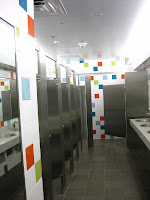The issue I picked for my advocacy project is clean water. The current legislation that adresses this is
The Federal Water Pollution Control Act (AKA The Clean Water Act).
Who is affected the most by this bill? The Amerian public is affected the most. If this bill were not enacted, we would see a considerable decrease in the quality of our Nation's water. Our corporations have the most to lose in this bill since they have to spend a considerable amount of money cleaning their water run-off, but we the people of the world have the most to gain by having clean water sources. Consequences of not having clean wateraffect everyone from individuals to society as a whole.
The eocnomic costs of the issue are companies paying more money to clean their waste products, but the gain is that we are not paying a loss of clean water or thousands of dollars to restore our clean water. The social impact of this is the public fighting to get clean water for drinking, swimming, etc., as well as providing clean water to other countries. By companies watching their pollutants, and by individuals watching what they dump in waters, we socially benefit by having not polluting be a corporate norm.
Barriers addressing this issue are the fiscal costs of keeping our water clean, but these barriers can be overcome by creating simple ways to keep water pollutants down. Resources for this issue are individuals working for the
Environmental Protection Agency [EPA]. They can be tapped at anytime by going to
http://www.epa.gov/epahome/comments.htm and seeing all the resources the EPA has and also to contact the EPA.
There is a long history to the issue of water quality. In the Great Lakes community is has been long as there is a vast quantity of water that we the citizens want protected, which is why in 1978 by the
Great Lakes Water Quality Agreement came about. The result was the forced upkeep of our Great Lakes to stay clean.
I believe there are many people to support this cause for clean water, especially those living on large bodies of water. Opposers would be companies who want to save money by dumping their waste in water bodies. To create a common ground, companies who practice safe waste removal ways will be subject to tested, and if they pass the standards we will impose, then they get a monetary refund from the government.
I want everyone to be on board in keeping this bill alive.



















